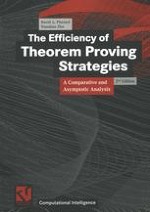
1999 | OriginalPaper | Buchkapitel
The Propositional Complexity of First-Order Theorem Proving Strategies
verfasst von : David A. Plaisted, Yunshan Zhu
Erschienen in: The Efficiency of Theorem Proving Strategies
Verlag: Vieweg+Teubner Verlag
Enthalten in: Professional Book Archive
Aktivieren Sie unsere intelligente Suche, um passende Fachinhalte oder Patente zu finden.
Wählen Sie Textabschnitte aus um mit Künstlicher Intelligenz passenden Patente zu finden. powered by
Markieren Sie Textabschnitte, um KI-gestützt weitere passende Inhalte zu finden. powered by
The efficiency of a theorem prover is more directly influenced by the total number of inferences performed before a proof is found than by the size of the final proof. In general, in the field of automated deduction for full first-order logic, there has been a great deal of attention devoted to the completeness of strategies but little to their efficiency, in the sense of the total work expended in the search for a proof. The main efficiency considerations to date have to do with the times needed by particular implementations to find proofs of particular example theorems, or with the efficiencies of decision procedures for specialized theories. Of course, there has also been work on the efficiencies of low-level operations employed by theorem provers (such as unification). It is informative (and fun) to evaluate a prover by running it on a series of examples, but this could well be supplemented by analytical results. To this end, a theoretical study would be useful. It would be nice to know something about the behaviors of proposed new strategies without having to read and understand papers about them or having to run them on examples. Theoretical measures of search space size would permit this. Such measures would also make it easier to weed out bad strategies early and would stimulate the development of good ones. There is more at issue than just a quantitative measure of performance — analytical measures reveal something about how a strategy works, and how it does subgoaling. This gives some insight into the strategy. A theoretical approach could also help to pinpoint problem areas and weaknesses in a method and lead to improvements. In general, theory does not replace experiment but it does supplement it, and provides insights that might otherwise be missed. Theory tends to make general statements and to be machine-independent, whereas experiment tends to deal in specifics and to be machine-dependent. This paper is an attempt to initiate (or further) a theory of the search efficiency of automated theorem proving.